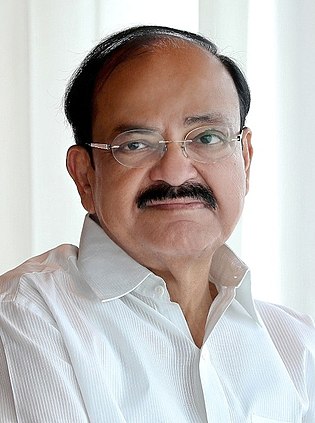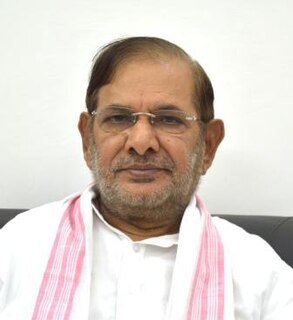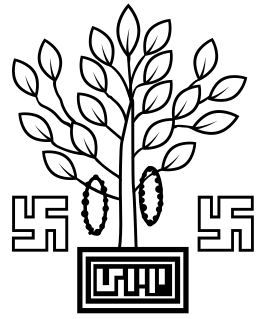Related Research Articles

The Rajya Sabha or the Council of States is the upper house of the bicameral Parliament of India. As of 2021 it has a maximum membership of 245, of which 233 are elected by the legislatures of the states and union territories using single transferable votes through Open Ballot while the President can appoint 12 members for their contributions to art, literature, science, and social services. The potential seating capacity of the Rajya Sabha is 250, according to article 80 of the Indian Constitution. Members sit for staggered terms lasting six years, with elections every year with about a third of the 233 designates up for election every two years, in even-numbered years. The Rajya Sabha meets in continuous sessions, and unlike the Lok Sabha, being the lower house of the Parliament, the Rajya Sabha, which is the upper house of Parliament, is not subjected to dissolution. However, the Rajya Sabha, like the Lok Sabha can be prorogued by the President.

The Lok Sabha, or House of the People, is the lower house of India's bicameral Parliament, with the upper house being the Rajya Sabha. Members of the Lok Sabha are elected by an adult universal suffrage and a first-past-the-post system to represent their respective constituencies, and they hold their seats for five years or until the body is dissolved by the President on the advice of the council of ministers. The house meets in the Lok Sabha Chambers of the Sansad Bhavan, New Delhi.

Samajwadi Party is a political party in India, headquartered in New Delhi. Although it contests elections in several states, its main base is in Uttar Pradesh, where it is currently the Opposition in the Legislative Assembly. It currently holds 5 seats in the Lok Sabha.

The Parliament of India is the supreme legislative body of the Republic of India. It is a bicameral legislature composed of the President of India and the two houses: the Rajya Sabha and the Lok Sabha. The President in his role as head of legislature has full powers to summon and prorogue either house of Parliament or to dissolve Lok Sabha. The president can exercise these powers only upon the advice of the Prime Minister and his Union Council of Ministers.

The Vice President of India, officially the Vice President of the Republic of India, is the second-highest constitutional office in India after the President. Article 63 of Indian Constitution states that "There shall be a vice president of India." The vice president acts as president in the absence of the president due to death, resignation, impeachment, or other situations.

The Marumalarchi Dravida Munnetra Kazhagam is a political party active in the Indian states of Tamil Nadu and Puducherry. It was established by Vaiko in 1994 after he left the Dravida Munnetra Kazhagam.
India has a parliamentary system as defined by its constitution, with power distributed between the central government and the states.

The Speaker of the Lok Sabha is the presiding officer and the highest authority of the Lok Sabha, the lower house of the Parliament of India. The speaker is elected generally in the first meeting of the Lok Sabha following general elections. Serving for a term of five years, the speaker chosen from sitting members of the Lok Sabha.
This is a brief description of the lawmaking procedure in India.

Prasanna Acharya is a politician from Odisha, India who sits in the Rajya Sabha, the upper house of the Indian parliament. He is a member of the Biju Janata Dal (BJD) political party.

List of Members of the 7th Lok Sabha, elected December 1979 – January 1980. The Lok Sabha is the lower house in the Parliament of India nine sitting members from Rajya Sabha were elected to 7th Lok Sabha after the 1980 Indian general election. Indira Gandhi became the Prime minister on 14 January 1980, after INC and alliances won 373 seats, 286 seats more than previous 6th Lok Sabha. Rajiv Gandhi became Prime minister on 31 October 1984 after the assassination of Indira Gandhi. The next 8th Lok Sabha was formed on 31 December 1984 after the 1984 Indian general election. With roughly 9.3% of total MPs being Muslims, the 7th Lok Sabha had more Muslim MPs than any other in Indian history.

Sharad Yadav is a politician from the Loktantrik Janata Dal party. He has been elected to Lok Sabha seven times and to Rajya Sabha thrice from JD(U). He was the national president of Janata Dal (United) since its formation in 2003 till year 2016. He was disqualified from Rajya Sabha and removed from party leadership positions for engaging in anti-party activities.
Members of the 15th Lok Sabha were elected during the 2009 general election in India. It was dissolved on 18 May 2014 by President Pranab Mukherjee.

Elections in the state of Bihar, India are conducted in accordance with the Constitution of India. The Assembly of Bihar creates laws regarding the conduct of local body elections unilaterally while any changes by the state legislature to the conduct of state level elections need to be approved by the Parliament of India.

The Lokpal and Lokayuktas Act, 2013, commonly known as The Lokpal Act, is an anti-corruption Act of Indian Parliament in India which "seeks to provide for the establishment of the institution of Lokpal to inquire into allegations of corruption against certain important public functionaries including the Prime Minister, cabinet ministers, members of parliament, Group A officials of the Central Government and for matters connecting them".

A Member of Parliament in the Rajya Sabha is the representative of the Indian states to the one of the two houses of the Parliament of India. Rajya Sabha MPs are elected by the electoral college of the elected members of the State Assembly with a system of proportional representation by a single transferable vote. Parliament of India is bicameral with two houses; Rajya Sabha and the Lok Sabha. The total number of members of Rajya Sabha are lesser than the Members of Parliament in the Lok Sabha and have more restricted power than the lower house. Unlike membership to the Lok Sabha, membership to the Rajya Sabha is permanent body and cannot be dissolved at any time. However every second year, one third of the members are retired and vacancy are filled up by fresh elections and Presidential nomination at the beginning of every third year.

Member of Parliament (MP) in India refers to persons who serve as legislators in the Parliament of India. There are two types of MPs who serve in either house of India's bicameral federal legislature.
References
- ↑ "IndiaVotes AC: Party peformance over elections - Lok Rajya Party". IndiaVotes. Retrieved 21 September 2021.
This article needs additional citations for verification .(November 2021) |